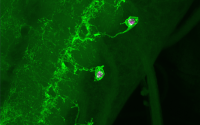Crawling to an understanding of early events in Parkinson’s.
- Date
- 24 Jun 2025
- Start time
- 7:00 PM
- Venue
- Tempest Anderson Hall
- Speaker
- Professor Sean Sweeney, University of York

Crawling to an understanding of early events in Parkinson’s.
Professor Sean Sweeney, Department of Biology, University of York
The movement disorder Parkinson’s is the result of loss of neurons in the brain that secrete the molecule dopamine and often occurs with increasing age. Diagnosis will unfortunately occur by the time that 30-50% of these critical neurons have already died. Events occurring in dopamine secreting neurons that pre-dispose neurons to death are not presently clear. How do we identify mechanisms driving neuronal death? One strategy to try to understand early events prior to neuronal cell death is by examining neurons from brains bearing inherited mutations that cause a disposition to Parkinson’s (genetic ‘risk factors’). This approach should allow us to detect early differences between affected and normal neurons.
In my talk I will introduce our approach to using the fruit fly Drosophila melanogaster to predispose neurons to Parkinson’s outcomes. The fruit fly has been critical in helping us understand mechanisms driving Parkinson’s and in our current study they allow us to manipulate the dopamine secreting neurons in the larval stage of the fly brain while studying behaviour. Using this system we can also visualise events in the neurons to understand how changes caused by genetic risk factors result in changes in neuronal activity. The use of flies allows us to feed the animals experimental drugs to reverse these changes and we are currently identifying new drug approaches to treating Parkinson’s.
Biography:
Harking from Ayrshire originally, I studied for a degree in Biology and Chemistry at Staffordshire University. After a period as a lab research technician in Leicester, I gained an excitement for lab bench-based research, moving on to study for a PhD in Genetics at Cambridge. My PhD saw me develop methods for silencing individual neurons in Drosophila to allow a mapping of neurons to define their roles in specific behaviours. I enjoyed a 4 year fellowship at the University of California, San Francisco where I studied the cell biology of synapses in Drosophila and was recruited to the University of York in 2004. While working in York I have made contributions, using fruit flies, to understanding mechanisms driving Parkinson’s, Frontotemporal Dementia, lysosomal storage disease and motorneuron disease. I was promoted to Professor in 2022.
7pm in the Tempest Anderson Lecture Theatre in the Yorkshire Museum on Tuesday 25 February 2025.
Please note that the 2025 YPS AGM will be held at 6.30pm this evening.
YPS Members free, non members £5.